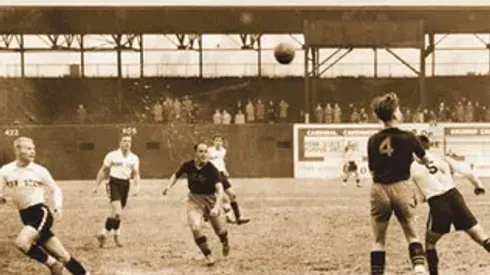As MLS and the U.S. Soccer Federation try to create a modern soccer history, complete with its heroes, stories, and even villains, they often set aside our nation’s soccer past to complete their narrative. We often forget that the United States had an incredible soccer history before 1994. Before the Seattle Sounders won three straight U.S. Open Cups in the 2000s, Bethlehem Steel won four out of five between 1915 and 1919. If you think naming a professional team after an energy drink was offensive, try naming one after a St. Louis department store (Stix, Baer and Fuller). The fact is the history of U.S. soccer is littered with failures and missteps, so that in many ways it is easy for the current soccer structure to set aside this past and create a new history. However, when that happens, we fans lose a rich and interesting story.
David Wangerin’s final book Distant Corners: American Soccer’s History of Missed Opportunities and Lost Causes fills that gap. The book (which was released in paperback on March 28) shares some of the in-depth stories of key moments in U.S. soccer history where the game could have taken off, but for various reasons did not. These six stories were for the most part not included in Wangerin’s monumental book Soccer in a Football World. However they are given the in-depth treatment in Distant Corners, which illustrates why these moments were critical to our shared soccer history.
The book begins in a poignant manner, discussing a visit to the grave of Tom Cahill, the man most responsible for the establishment of the U.S. Open Cup and U.S. Soccer Federation. What is most interesting about this preface is that Wangerin stops to visit the unadorned grave of a pioneer of U.S. soccer while on his way to visit the Soccer Hall of Fame, which is located in a warehouse in North Carolina.
From the beginning, soccer was at a disadvantage from other sports because of the backward perception of how it formed young men. In England’s school yards, soccer gained popularity as a physical activity designed to make England’s young men more masculine. In America, however, Wangerin notes the opposite: “in an industrialized country increasingly fearful of becoming effete, aggression on the [football] gridiron, even at the risk of serious injury, had come to be perceived as a welcome demonstration of masculinity.” The comparisons to the other popular sports of the time meant soccer continually had to prove its worth as sporting entertainment to the American public. This book details six instances of where it had the chance to form a lasting foothold in the American consciousness.
If the point of this book is to argue that these six instances were crossroads or pivotal points in soccer’s development, than this book is at best decent. Wangerin makes a compelling case that the visit of Pilgrim Football Club, an amateur travel team that in 1905 toured the United States, was an early chance for soccer to gain a permanent following. He notes the high crowds, press interest, and desire of cities to play the games as opportunities for the creation of leagues or at least stable clubs. However, he notes that the press mainly wanted to cover the spectacle of these fashionable foreign players. Once the Pilgrims departed, the country essentially remained unchanged in its attention to the sport. This chapter and the one on the North American Soccer League of the 1970’s stood out as the best opportunities for soccer to gain a foothold in the United States.
If this book is to be taken as a chronicle of stories forgotten and times unremembered, it is an absolute gem. I found myself riveted by the story of the California Clippers and the early 1960s professional leagues. I was rooting for Tom Cahill, who may have been more interested in selling sporting goods than creating a soccer league. I also learned many facts and stories I would have never known otherwise from this book. It would be worthy member to any dedicated soccer fan’s library.
David Wangerin’s death deprived this country of a serious soccer historian, someone with the clout and dedication to tell America’s soccer story. Fortunately, we are left with his excellent books like this one. Distant Corners is not a quick read despite its short length and at times can be too academic, but it is an essential read for anyone who wants to know the real history of soccer in this football world.
Distant Corners is available via Amazon and all fine booksellers.














